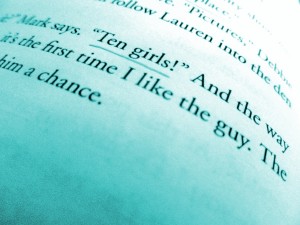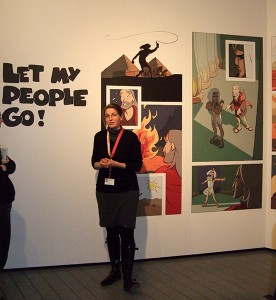 In the past, a number of literary texts on Jewish topics contributed to Jewish culture in various ways. Some documented and revitalized oral history and folk tales in an attempt to save them from oblivion (e.g. Martin Buber’s Tale of the Hasidim); others made Jewish topics palatable to the majority society (e.g. Sidney Taylor’s All-of-a-Kind Family); and still others helped to build a Jewish community around shared experiences of ritual, emigration and persecution (e.g. Friedrich Torberg’s Tante Jolesch or The Decline of the West in Anecdotes).
In the past, a number of literary texts on Jewish topics contributed to Jewish culture in various ways. Some documented and revitalized oral history and folk tales in an attempt to save them from oblivion (e.g. Martin Buber’s Tale of the Hasidim); others made Jewish topics palatable to the majority society (e.g. Sidney Taylor’s All-of-a-Kind Family); and still others helped to build a Jewish community around shared experiences of ritual, emigration and persecution (e.g. Friedrich Torberg’s Tante Jolesch or The Decline of the West in Anecdotes).
Nathan Englander, one of the most sophisticated and provocative current writers, shares none of these intentions. His latest book, What We Talk About When We Talk About Anne Frank, is a collection of eight short stories loosely bound together under the title of (and a quote from) the first story, arising from a heated conversation about genocide; it refers to Anne Frank not as a historical figure, but as a metonym of victimhood. Accordingly, the stories reflect on the effect of Jewish themes, such as religion, the Holocaust and Israel, on modern Jewish identities. The author’s perspective is from within – he was born in 1970 to an Orthodox-Jewish family in New York – and critical. His gripping, intimate theatre-like episodes are fraught with tense dialog questioning the validity of Jewish cultural practice: → continue reading
This year, the national museum assistant convention of the German Museums Association took place from March 1 to 3 in Frankfurt-am-Main, and the theme was “Museum today: ideals, trends, and perspectives.” The convention offered academic trainees from federal German museums and memorials an extensive array of lectures, excursions, and workshops. Along with all the other museum assistants, I was impressed by the diversity of events. The Historical Museum served as a set starting point, having put nearly its entire premises at the disposal of the convention.

Sabine Kößling in front of the remodeled mural at the Jewish Museum Frankfurt
© photo: Michaela Roßberg, Jewish Museum Berlin
On the day of our arrival, there was already a chance to take a tour through one of the many museums on the embankment of the Main. I visited the Jewish Museum Frankfurt, where our group was guided by Sabine Kößling, a former museum assistant at the Jewish Museum Berlin. She told us about the planned conception of the permanent exhibition, which originates largely from 1988, the year that the museum was founded. The reworking of the exhibition is being done in stages, so that the entire museum won’t need to be closed to visitors until 2014. The section on “Festivals and feast days – religious life”, for example, was being augmented with a large mural depicting the story of Moses and the Pharaoh.
The second day featured a number of workshops. I participated first in one called “Provenance research is power: arm yourself.” → continue reading
With a flip of a wrist, showcases turn arbitrary objects into works of art. Now, I can find out what it will do to a human being. I am sitting in a transparent case which is part of the current special exhibition “The Whole Truth… everything you always wanted to know about Jews.” The visitors pass by, and we observe each other. Many read the text on the wall, throw me a look and hurry away.

Olga Mannheimer as a guest in the “Whole Truth” exhibition
© photo: Ernst Fesseler, Jewish Museum Berlin
Some stop, but keep a safe distance. I clear my throat, smile invitingly, and motion to the button on my blouse: “Ask me, I’m Jewish.” I qualified for this position, as I learned from a speech at the opening of the exhibition, by claiming to be able to tell the “whole truth” about Jews. Will anyone ask me to? The distance gradually shortens. One man wants to know what the object label on the case-window says – he does not have his reading-glasses with him. “Species: Diaspora Jew, Sub-species: Eastern European Jew, Variant: Banana Jew.” Thank you, says the man, and leaves quickly. “Banana Jew? Never heard of it,” says a woman. That was the term for Jews in Poland, I explain, who received citrus fruits and bananas from their relatives in the West.
Hesitantly, more people join the bystanders in front of my showcase. “Are you allowed to bring flowers to a seder?” “Can you sew a foreskin back on?” → continue reading
 In the past, a number of literary texts on Jewish topics contributed to Jewish culture in various ways. Some documented and revitalized oral history and folk tales in an attempt to save them from oblivion (e.g. Martin Buber’s Tale of the Hasidim); others made Jewish topics palatable to the majority society (e.g. Sidney Taylor’s All-of-a-Kind Family); and still others helped to build a Jewish community around shared experiences of ritual, emigration and persecution (e.g. Friedrich Torberg’s Tante Jolesch or The Decline of the West in Anecdotes).
In the past, a number of literary texts on Jewish topics contributed to Jewish culture in various ways. Some documented and revitalized oral history and folk tales in an attempt to save them from oblivion (e.g. Martin Buber’s Tale of the Hasidim); others made Jewish topics palatable to the majority society (e.g. Sidney Taylor’s All-of-a-Kind Family); and still others helped to build a Jewish community around shared experiences of ritual, emigration and persecution (e.g. Friedrich Torberg’s Tante Jolesch or The Decline of the West in Anecdotes).
